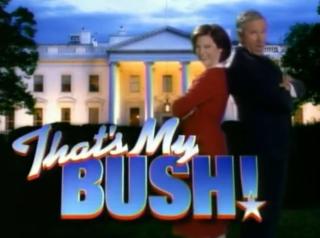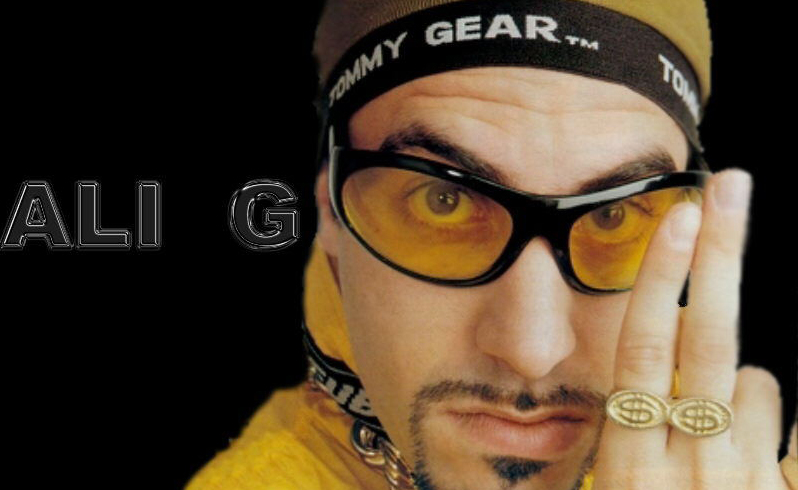In a series of epilogues concluding Sacha Baron Cohen’s The Dictator, the newly re-branded North-African tyrant, democratized by the love of a Jewish-American organic grocer and elected with some help from artillery aimed at opposition voters, learns during a TV appearance that his hipster bride is pregnant. He asks her in front of the world, “Are you having a boy? Or an abortion?” The kind of self-control that will be required of the first “president” of the fictional nation of Wadiya will not be easy. But it’s required if he is to remain an international player. Maintaining the illusion of security is a player’s job in a world on fire.
The shape-shifting, British shock-trooper, Baron Cohen appears to be facing a similar future of auto-policing his own dark impulses, or at least his satire.
Shortly after September 11, 2001, Roger Rosenblatt wrote in Time magazine of his hope that our “chattering classes – our columnists and pop-culture makers” would open their eyes to reality. “The consequence of thinking that nothing is real – apart from prancing around in an air of vain stupidity–is that one will not know the difference between a joke and a menace,” he declared, apparently ignorant that a joke is a menace. He added, “one good thing could come from this horror: it could spell the end of the age of irony.”
Farewell to public irony
And Rosenblatt wasn’t the only one to offer up satire on the altar of security. Humorists everywhere tastefully agreed to stop making anything that was potentially funny until the threat level fell from red. Comedy Central canceled That’s My Bush!, a sitcom about the then-beleaguered president in his final days of sub-basement approval ratings before starting the Iraq war. The writers at The Onion agreed to take time off. Vanity Fair’s Graydon Carter, formerly of the snarky Spy magazine, ironically, sang the chorus to Rosenblatt’s dirge. Comedy Central spokesperson Tony Fox told the press that The Daily Show would indeed return (meaning there had been doubt). Fox said, “Irony is dead for the moment.” This turned out to be good news for America’s two remaining mass-market satirists, Jon Stewart, and Stephen Colbert.
Prohibition can raise a commodity’s coinage. I want to note that Mr. Rosenblatt missed another irony. The critical look at reality that Rosenblatt envisions requires irony. Irony and satire make things visible. They do so by revealing falsely-made connections that don’t exist, Saddam Hussein with Al Qaeda for example, or by drawing connections between things we wish didn’t connect but do – the Reagan/Bush I and Bush II/Cheney White House with the Mujaheddin/Osama bin Laden or human consumption with the coming climate disaster.
In America, satire is like marijuana. Medicalized strains are legal in places, but it can’t be officially tolerated. In themselves, these substances don’t threaten the stability of the world’s largest Superbrand – America: The Post-911 Collection. But tolerance of their use does pose a threat because it acknowledges what the brand (and branding in general) must deny – self-contradiction. A president who smoked pot or snorted coke is difficult to square with Brand America. A president who smoked pot AND supports the crackdown by federal agents on state-licensed dispensaries of “legal” medical Mary Jane is an even better example of the kind of contradiction we just can’t grok.
So, if you dispense satire in Post-911 America you’re allowed to prescribe one very weak strain found to have no long-term effects; it’s a native hybrid called parody. Parody can fit with the mono-thought of Brand America; it can deny contradiction and pedal certainty. Satire lives and dies with contradiction. And this is why it’s so hard to see Sacha Baron Cohen behind such a film as Paramount’s The Dictator.
The Baron Cohen approach
Baron Cohen is a consummate satirist. For a decade he exposed the myopia that both enables, and is the result of, the kind of brand alignment he and his character, General Admiral Aladeen are in the process of. Brand alignment happens when a company or person remakes him-, her-, or itself in the image of a superbrand (the person is the family, the family is the corporation, they’re all three the state which is the brand).
Today the largest, most powerful, mainstream brand might be called something like Brand Outsider or Brand Maverick following Newt Gingrich, who forgettably followed John McCain’s barely-memorable incarnation of G.W. Bush’s reprisal of Ronald Reagan’s self-identification as Orwellian Rebel-in-Chief. It’s like when everything but rap was called “alternative music.” We can’t even see these ironies through the brands that conceal them, but Baron Cohen, the formerly-fearless provocateur, repeatedly exposed such processes of alignment by going after the armies of the witless. He also claimed bigotry, anti-intellectualism, homophobia, and rabid nationalism as frequent targets. It’s serious work that he performed by assuming the position and persona of an actual outsider and it was on those margins that Baron Cohen revealed his genius, and the genius of many of his victims.
Suburban gangsta rapper Ali G turned out endlessly creative stupidity to elicit thoughtlessness, and rage. The mustache-twirling anti-Semitism and post-Soviet “backwardness” of Kazakhstani journalist, Borat Sagdiyev, brought out uncomfortably recognizable acts of hatred and racism. With uber-flamboyance the gay fashion icon, Bruno, courted homophobia, fear and even acts of violence. But I never saw Baron Cohen assume a position of superiority over his flawed adversaries even when they threw chairs. Somehow, his fictional characters and his victims always seem more human after spontaneously revealing something of themselves in a ridiculous interview or impossibly tense “real life” drama, like the one resulting in a lesson for Borat on where to dispose of his shit, a plastic bag of which he brought back to the table at a society dinner party. Even the fashionistas, who agreed with Bruno that people without style should be put on trains and hauled into camps, come off as complex. Are they Nazis? Maybe. Are they complete human beings? Definitely.
Baron Cohen doesn’t give us permission to hate the haters. It’s a mystery how he does this and more so a mystery why he stopped. Outright censorship had no effect on him. He persisted when the president of Kazakhstan tried to ban Borat. Satire can harm your nation’s chances of aligning with Brand European Union. Yes, it’s unfair, satirists throw pies (and other things) and somebody has to get hit – again, useful contradictions at work, not because they upset the harmonious balance of the brand but because they reveal that the harmony is painted on… quickly, and by amateurs who repeatedly botch the job.
Farewell to danger
But I fear the dangerous Baron Cohen has retired – at least for the run of The Dictator, which is not a satire. It doesn’t walk the edge between exhibiting hatred and laying down an excoriation of haters. It doesn’t make space for sharp observations of people at their most vulnerable. It doesn’t ever let an audience decide how to make use of the things it represents. It simply tells you who to condescend to – everyone. The Dictator doesn’t do much of anything that Baron Cohen excels at. It’s a well-behaved, American parody cloned from the DNA of those by the more lackluster SNL grads.
The plot follows the oil-rich dictator Aladeen who is ordered to New York by President Obama to address the UN about his developing nuclear program. Before Aladeen can address the general assembly, the dictator is kidnapped as part of an assassination plot. He becomes separated from his beard and is dropped, unrecognizable, on the streets of the city. (By the way, that beard delivers the second most compelling performance in the film.) Aladeen fights to regain power before his uncle and betrayer (Ben Kingsley) can democratize Wadiya and monetize its oil rights. There’s a romance between Aladeen and the somewhat ambiguously-gendered socialist, Zoey (Anna Faris), who sees the true man trapped inside the alleged mass-murderer. She’s so smitten that she vows to shave her armpits. Changed by the love of such a woman, Aladeen wins back his dictatorship and “speaks truth to power” revealing the American ethos to be in alignment with his own elitist, homophobic, racist, murderous, tyrannical, war-mongering world view, which the epilogue reveals hasn’t much changed, making Zoey into a dupe, finally.
Obviously, the problem with The Dictator isn’t its plot. The plot is fine ground on which Baron Cohen might perform. The problem isn’t that it’s just a parody. Parody can be hilarious (see Tina Fey or Ricky Gervais) – though Satire is dangerous even when it’s not all that funny (see Lenny Bruce). The main problem is that the film is foremost an advertisement for a brand. It asks only one thing of its audience: show up.
The question is why? Why, after Ali G., Borat and Bruno, make a comfortable American comedy that reduces every character and conflict to a set of tropes? The answer is… I haven’t found an answer. I can’t in good conscience chalk it up to Baron Cohen’s ever-increasing budgets and massive paychecks corrupting his vision because that story would be a bad parody of itself. I can’t posit mythic studio pressure that has worked to turn Baron Cohen’s genius, albeit unsuccessfully, toward generating a more lucrative American version of his UK self. Something more complex is functioning here, something full of contradictions. But it’s probably related to the self-policing of satire in America: The Post-911 Collection where, for reasons unknown, we pretend that we only wish to see the brand identity as it masks the messy contradictions of a world that we can never really feel secure about.
Are we ultimately content, in a world so obviously beyond our control, to live firmly within the illusion that we at least control ourselves?
Images: Top and bottom, Sacha Baron Cohen as The Dictator and Ali G; middle, Comedy Central’s short-lived series, That’s My Bush!


